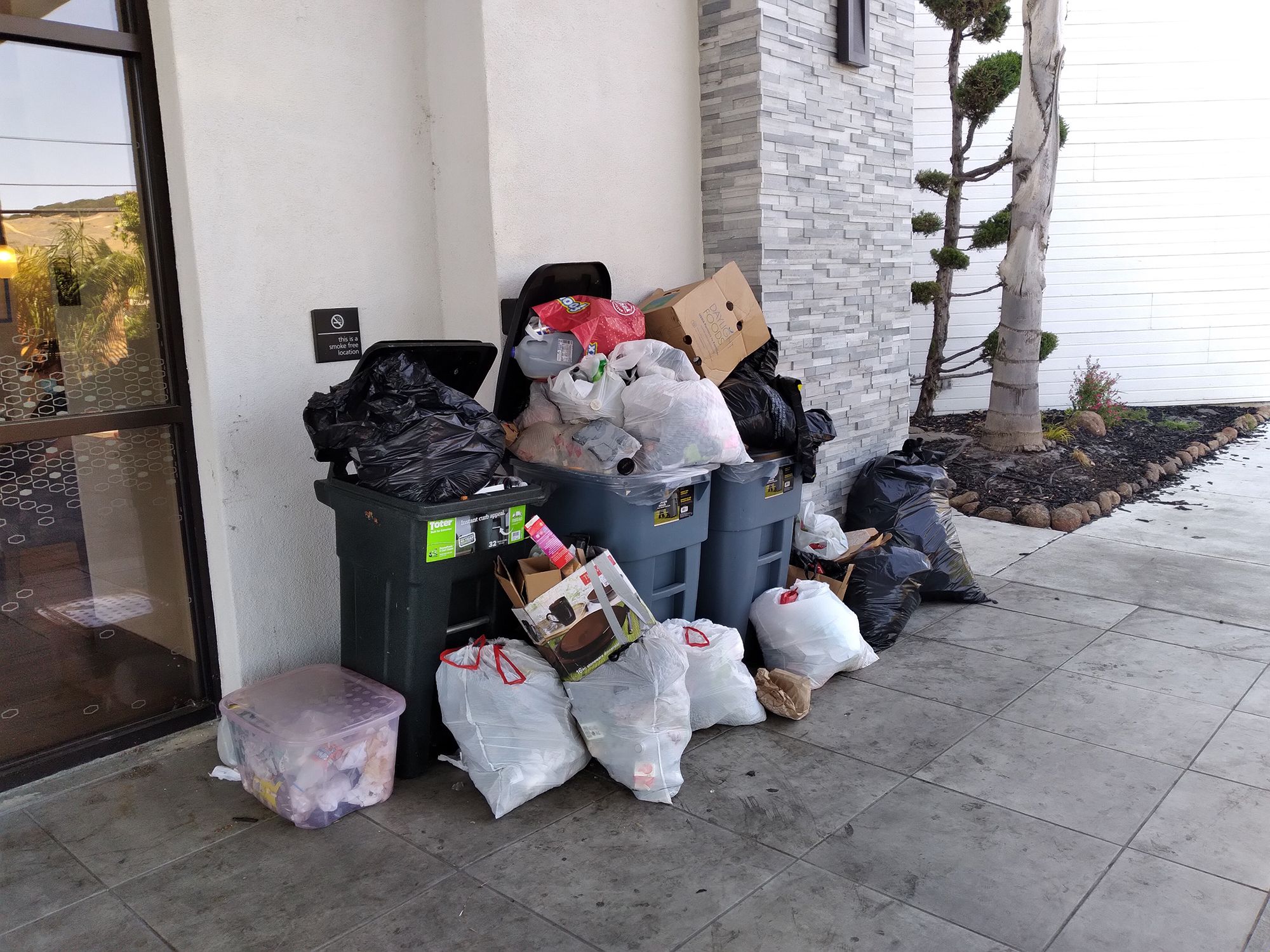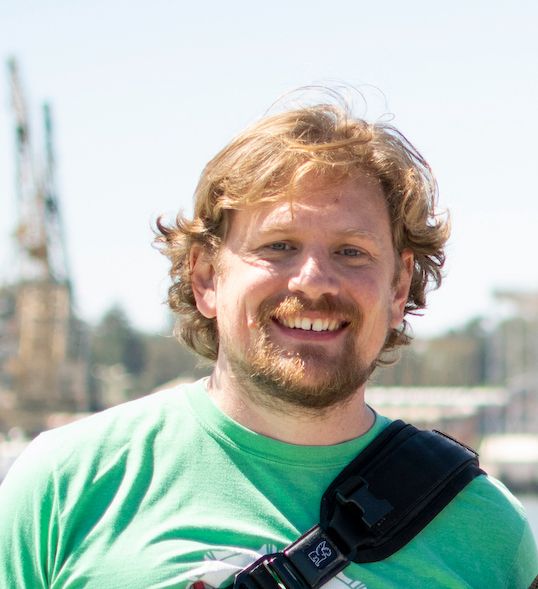VALLEJO – The city of Vallejo was warned of deteriorating and hazardous conditions inside hotels it used for Project RoomKey – a program that provided housing for vulnerable people experiencing homelessness during the pandemic – but the city’s former housing manager either ignored them or took measures that were inadequate, newly released records show.
Emails between former Vallejo Housing and Community Development Manager Judy Shepard-Hall and the city’s contracted case management provider Unity Care obtained through a public records request show that Shepard-Hall received a scathing mold evaluation of a motel housing homeless people but didn’t act on it for six months.
After participants were moved to another hotel, Unity Care’s Vallejo program director Kevin Sharps repeatedly asked Shepard-Hall for more janitorial services, complaining of needles on the lawn and urine and feces in hallways. His complaints continued until he threatened to pull his staff out of the hotel.
In May 2021, Shepard-Hall was removed from the program and it was placed directly under the supervision of the city’s risk manager. Shepard-Hall was placed on leave and City Manager Greg Nyhoff disappeared from his post and resigned shortly after that.
Meanwhile, at least five people died in the program, including three who were not found for days after their deaths.
The Vallejo Sun published an investigation into the program conditions in March. People who experienced it firsthand complained that conditions were filthy and the deaths in the program raised questions about what safeguards were put in place to protect the medically vulnerable population.
The emails, however, provide the clearest glimpse so far into how Vallejo’s Project Roomkey was managed.
In response to written questions, Vallejo spokesperson Christina Lee provided a statement with several demonstrable falsehoods contradicted by emails and other documents obtained via public records request. For example, the city claimed it was first alerted to mold in the Rodeway Inn by Unity Care, but emails and a log of participant complaints show that city officials knew the Rodeway had a mold infestation nearly two months before Unity Care’s contract began. The city did nothing in response to those initial complaints.
Also, for the first time since January, the city finally said how many people died in the program, with Lee saying in written statement that there was, “a total of five participants that passed while they were enrolled in the Project Room Key program (PRK) between the dates of November 2020 and June 2021.”
That acknowledgement comes nearly a month after the Sun independently confirmed there had been five deaths in Vallejo’s Project Roomkey, and more than four months after the Sun asked city officials about deaths among residents in the program.
“While the Project Roomkey program was very challenging, it was equally rewarding,” Lee said. “We were able to take a little under 200 people off the streets and offer them shelter with indoor plumbing, meals, essential hygiene items, and access to services.”
The program was started in the early days of the COVID-19 pandemic and was intended to help people who were especially vulnerable if they contracted the virus. Of 135 people in the program, 92 had a chronic health condition and 61 had a physical disability, according to summary participant data collected by the city.
Early on, program participants were moved to the Rodeway Inn, a residential motel near Interstate 80. A log of complaints after participants were moved showed numerous problems with the conditions in the Rodeway. Residents described leaking ceilings, sinks and toilets, and broken beds, refrigerators, phones and TVs. Two residents asked for accommodations for their disability – a raised toilet seat or bar handle to get into the bathtub – which the Rodeway did not provide. Many residents reported roaches. One person said there were maggots all over the floor. Some residents reported mold, including an asthma patient.
Vallejo hired Unity Care in October 2020 to provide case management services for participants. Unity Care is a San Jose-based organization that provides services for foster youth and had not previously run a homeless shelter. The provisions of the contract included to “check in with Participants multiple times per day to identify any basic need” and to keep a 24-hour emergency phone for any case management emergencies and a staff member on call at all times.
In November 2020, three people died in the Rodeway Inn. Cinthia Castenada was taken to the hospital the night of Nov. 9, 2020, and later died there.
On Nov. 20, 2020, 52-year-old Gary Berg Jr. was found dead in his room. A coroner’s report identified his cause of death as congestive heart failure.
Then on Nov. 30, 50-year-old Angie Cook was found dead. The coroner’s investigation notes that Cook had not been seen for three days before she was found. She suffered from chronic obstructive pulmonary disease and needed oxygen.
On Dec. 1, 2020, the day after Cook was found dead, Sharps wrote an email to Shepard-Hall alerting her to mold infestation in the units. “A number of units have mold, so it may be in our best interest to have a mold remediation company do an analysis and give us a scope of work,” he wrote.
Later that month, an inspector from Express Air Testing in Burbank the city hired started evaluating the mold growth in the Rodeway Inn. But when the inspector arrived, they told Sharps that they’d been there before. “The Air Quality company is here,” Sharps wrote in a Dec. 22, 2020, email to Shepard-Hall. “They said that their test of unit 142 a while ago confirmed that there is pretty extreme mold. Was it ever remediated? That’s my office, now.”
Shepard-Hall responded by sending him a copy of the results for that room dated Aug. 20, 2020, confirming the mold. She did not say whether she had taken any action to remediate it.
Early the following year, RoomKey participants were moved back to the Hampton Inn, a hotel just down the road from the Six Flags Discovery Kingdom amusement park.
Lee, the city spokesperson, said discovering the mold triggered the move. “The City had been in discussion with the owners of the Rodeway Inn regarding a purchase of the building for longer-term use as transitional housing,” Lee said. “When discussions in that regard did not prove fruitful, the City instead took action by moving out of the building and terminating the contract with Rodeway Inn.”
According to Sharps, there were no janitorial services at the Hampton for two weeks after the move. “Was janitorial supposed to start today?” Sharps wrote in an email on March 12, 2021. “There are human biowastes (defecation) in the 2nd floor hallway that we are not prepared to handle. I hope that janitorial contract included the handling of human wastes.”
Shepard-Hall replied that the janitorial services would not handle biohazards and a separate crew from Ideal Building Recovery Solutions — a San Francisco firm that specializes in biohazard cleanup and other hazard abatement and disinfection — would need to respond.
But even when janitorial services started, Sharps continued to tell Shepard-Hall that they were inadequate. He wrote another email on April 27 seeking an update on expanding the scope of janitorial services. “The quality of the Hampton is deteriorating dramatically,” he wrote.

“Also, we have more biohazards on the property as a participant has urinated in the elevator and in the hallways and someone has also vomited in the elevator,” Sharps wrote in another email the next day. “We also have needles in the grass and bushes.”
Sharps requested Ideal come in to handle the biohazards. Shepard-Hall relayed photos between Sharps and Ideal to get a cost estimate for the scope of work necessary. The crew arrived on May 11, nearly two weeks after Sharps’ request.
By then, Unity Care had threatened to pull its staff out of the Hampton. Shepard-Hall had a meeting with Sharps on May 10 when Sharps informed her that he had been told to pull staff from the Project RoomKey program. Shepard-Hall sent an email to Sharps and Unity Care CEO Andre Chapman after that, expressing confusion with the decision.
“Andre, the city hired Unity Care to provide property management and case management services for Vallejo PRK,” Shepard-Hall wrote. “That said, it is not clear to me why the items of concern that Kevin mentioned above are being cited as the reason he was directed to pull staff off site, leaving the program without any supervision.”
Unity Care has disputed that it ever took over property management services for Project RoomKey, insisting its role was limited to case management.
Sharps responded to Shepard-Hall by outlining his numerous attempts to have adequate janitorial services in Project RoomKey. “I have consistently articulated the janitorial and biohazard challenges from the beginning of our tenure without resolution of these clear health and safety issues,” he wrote.
He said trash had piled up at the entrance door while Shepard-Hall had failed to secure services and that cleaners from Ideal had failed to show up or clean biohazards on multiple occasions.
“From day one, Judy, you and I have had conversations about the need to increase janitorial services and each time it’s been denied,” Sharps wrote. “I have requested janitorial for at least 30 hours/week, but those requests have not been granted, and everyone is universally frustrated with the poor quality of the property, exposure to animal and human biowastes, discarded needles, wet and moldy smelling carpets, and sewage smells.”
Sharps wrote that he had no oversight of janitorial or biohazard services and had to exclusively request these from the city, which he said was “amazingly inefficient and unproductive.” He wrote that Shepard-Hall had claimed Unity Care managed janitorial services, but “that has never been the case” and said that if janitorial services were not increased he would pull his staff off site in two days “to safeguard their health and safety.”
Three days later, on May 13, Chapman wrote an email that stated, “we’re still waiting for confirmation to our request of daily cleaning.”
Project RoomKey was not the only project by the Housing and Community Development department under Shepard-Hall that was in turmoil. A homeless navigation center slated to open in 2019 has been delayed numerous times and increasingly over budget.
On May 12, City Manager Greg Nyhoff wrote in a letter to the city council outlining his proposed budget that he had moved the navigation center project from the management of the housing department to public works. “I admit and accept failure for missing appropriate steps in the project management phase which caused nearly a year delay of the project,” Nyhoff wrote.
Project RoomKey was removed from Shepard-Hall’s oversight as well. Just after 7 a.m. on May 20, then-Assistant City Manager Anne Cardwell wrote an email to Unity Care informing them that their new contact with the city regarding Project RoomKey would be risk manager Armond Sarkis.
Then just before 10 a.m. the same day, 38-year-old Margaret Morgan was found dead in her room, but she had been dead for some time. The coroner’s investigation was unable to determine Morgan’s cause of death because her body was so badly decomposed.
On May 25, Shepard-Hall gave a disastrous presentation to the Vallejo City Council about the homeless navigation center. She told the council that not only had the city not started construction, but the budget to build the center had ballooned from $4 million to $8.7 million. She also said that $1.3 million had been diverted to maintain Project Roomkey.
A few days later, she was placed on leave. The city declined to comment on the reason. City Manager Greg Nyhoff disappeared from city hall shortly after that. A month later, Nyhoff resigned with a $577,536 severance.
Shepard-Hall and Nyhoff’s departures came amid an exodus of staff from city hall. About 80 city employees left during the first three quarters of 2021, according to data released by the city. For the housing department, exit interview data found that, “every separating employee said explicitly that their departure would have been prevented had their issues with Housing management not remained unaddressed.”
In December, interim Assistant City Manager Gillian Hayes, who now runs the housing division, told the city council that the department had only 30% staffing.
At about the same time that Shepard-Hall left her position, the fifth person known to have died in Project RoomKey, Cherie Nicoletta, was quarantined with COVID-19. She had been diagnosed with the virus in a hospital on June 1 and her son, Robbie Perry, took her back to the Hampton Inn to quarantine, despite that Unity Care’s contract called for it to coordinate hospital discharges.
Perry said that when he returned his mother to her room, he found the room in disarray and her sheets soiled, which he had to replace with sheets he bought himself. He continued to return to the Hampton periodically for the next two weeks to check on her.
Nicoletta’s family says that she called her son’s partner on Friday ,June 11 but did not speak and only moaned as if she were in pain. Her son said he went to the hotel to check on her, but he was unable to access her room with the key that she had provided him. Staff at the hotel told him to return on Monday when Sharps would be there, according to Perry.
Perry said he tried to get back into the room over the weekend but was unable to do so. When he returned the following Monday, he met Sharps, who opened the door for him, and he walked in and saw his mother there after she had been dead for days.
The newly released emails show that there were other problems with participants’ room keys.
On May 10, Sharps wrote an email seeking help with lock repairs. In two separate emails he indicated that at least four rooms had become inaccessible because of malfunctioning locks. None of the four rooms mentioned were Nicoletta’s. “We are having systemic lock failures that cannot be resolved by programming keys,” Sharps wrote. “Currently, two participants can’t gain access to their units.”
Unity Care did not seek to renew its contract when it ended in October 2021 and was replaced with another provider, Shelter Inc., according to the city. The city expected to pay about $1 million in damages to the hotel.
Meanwhile, the remaining approximately 50 participants were moved to a combination of different hotels and small trailers, including in Vacaville.
After the Vallejo Sun pointed out that the city’s statement contained information that was contradicted by public records, Hayes sent an email pointing out that most people involved in the management of Project RoomKey were not with the city anymore.
“In order to ascertain the exact date that Judy found out about the mold we would need time to go back through all of her emails again to see if that information exists, since we can’t ask her,” Hayes said. “No matter when she found out, it’s not correct for you to assume nothing was done.”
She did not respond to questions about what was done following the discovery in August 2020.
John Glidden contributed reporting.
Before you go...
It’s expensive to produce the kind of high-quality journalism we do at the Vallejo Sun. And we rely on reader support so we can keep publishing.
If you enjoy our regular beat reporting, in-depth investigations, and deep-dive podcast episodes, chip in so we can keep doing this work and bringing you the journalism you rely on.
Click here to become a sustaining member of our newsroom.
THE VALLEJO SUN NEWSLETTER
Investigative reporting, regular updates, events and more
- Housing
- health
- government
- Vallejo
- Vallejo Housing Authority
- Project Roomkey
- homelessness
- Unity Care
- Judy Shepard-Hall
- Kevin Sharps
- Greg Nyhoff
- Anne Cardwell
- Christina Lee
- Gillian Hayes
- Gary Berg Jr.
- Angela Cook
- Margaret Morgan
- Cheryl Nicoletta
- Hampton Inn
- Rodeway Inn
- Andre Chapman
- Armond Sarkis
- Vallejo City Council

Scott Morris
Scott Morris is a journalist based in Oakland who covers policing, protest, civil rights and far-right extremism. His work has been published in ProPublica, the Appeal and Oaklandside.
follow me :




